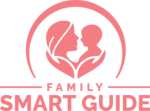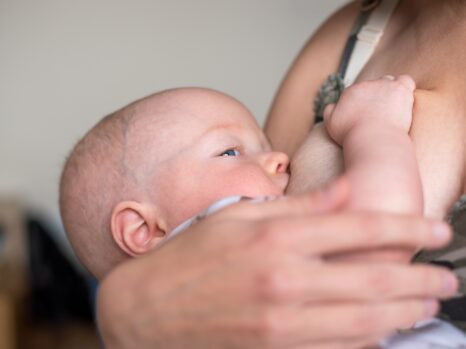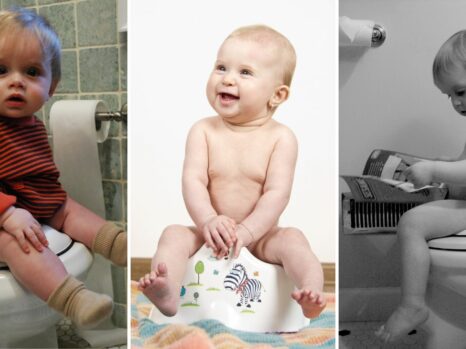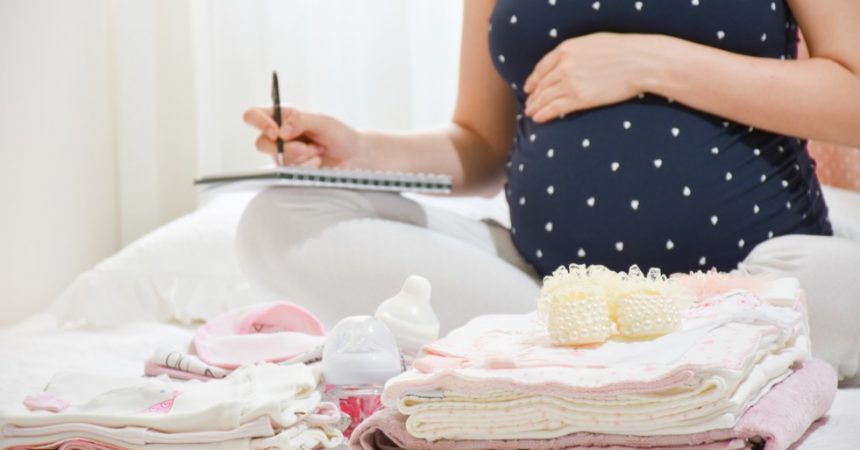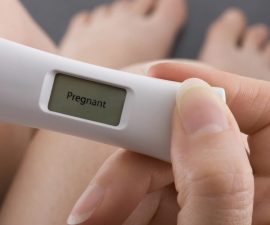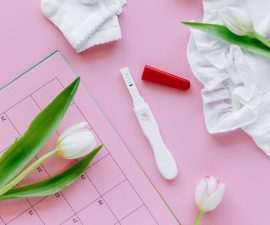Little did the couple know it was all because of this!! Here’s what happened…Josephine was in the eighth month of her pregnancy, preparing for the arrival of their little bundle of joy into the world.
Being her first pregnancy, she and her husband were both carried away by the ‘proper’ arrangement of the baby’s room that they forgot to prepare for the labour itself!
You might ask; what preparation did they need? Let’s see. As time drew closer to her due date, Josephine was overjoyed as everything required for the baby’s arrival was ready. She wasn’t prepared for what was going to hit her that night.
With what felt like a moving vehicle in her womb, Josephine jumped up from her comfortable bed in the middle of the night. She was sweating profusely. She quickly realized that her water had broken and she was already due!
Confused, Josephine looked at her calendar and exclaimed: “I’m three days early”. As a new to-be mother, she had followed the calendar her doctor gave her, and she was confident about it and had no fear, but now, she wasn’t sure of anything.
Quickly, she called her mother while her husband rushed her to the hospital. Labour was quite complicated for her because she was so uncomfortable. She didn’t have her soft pillow she was used to neither was there a lip balm available for her.
Luckily for Josephine, her mom knew she would face all these and brought the hospital bag essentials, and with these, she was delivered of her baby in no time!
Probably, you are also a new to-be mother like Josephine or already a mother, but with another pregnancy. If this is true, then I have something for you that would make child labour, at least, bearable.
The one thing I’m sure of is that you would not want to send your hubby out to get you little things when he’s supposed to be by your side, especially after delivery.
To avoid this, there are some necessities you should take with you to the hospital. What do I mean? A HOSPITAL BAG CHECKLIST DURING PREGNANCY. Let’s go on.
Pregnancy Hospital Bag Checklist
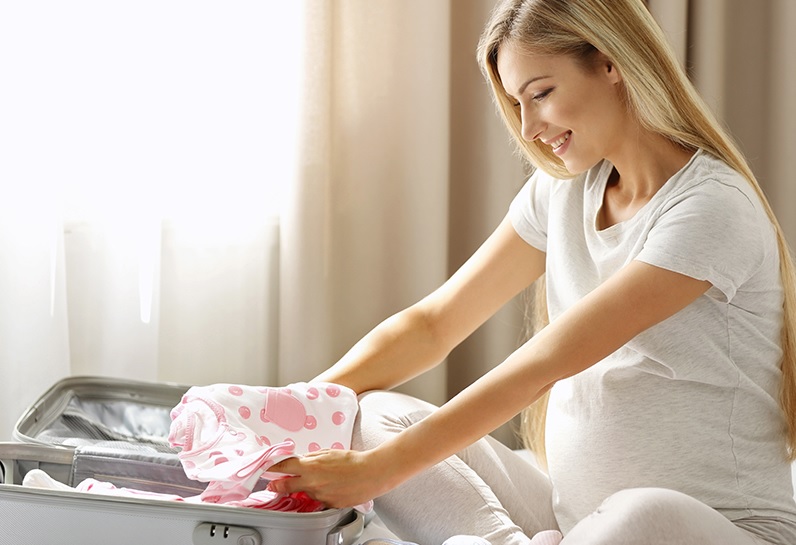
A pregnancy hospital bag is a bag of essentials that you take with you to the hospital when you are due and about to deliver your baby. This bag should contain the necessities you will need before and after birth.
It is most likely that your hospital would provide a pregnancy bag checklist for you to follow, but you can arrange it to suit your taste. Do well also to include those items that would make you more comfortable while in the hospital.
Remember this; the primary purpose of a pregnancy bag checklist is comfort and not necessarily support. Because of this, I would make it easier for you by listing the most important things you need to pack in your hospital bag.
Birth Plan
A birth plan is an outline of your preferences during your labour and after the birth of your child. It is a record of what you would like to happen during these times. Please take note that your birth plan is not a contract neither is it set in stone.
It would be best if you are very flexible about it so you and your doctors can make changes, in case of any urgency, as you cannot predict every single thing that happens when labour begins.
Creating a birth plan would help you prepare ahead of time so that when you are due, you would be able to focus on the most important thing, which is welcoming your baby into the world.
Now to the million-dollar question; what should I include in my birth plan?
In as much as you want your birth plan to be detailed, you should try to keep it short and clear for easy assimilation.
Here’s what you should include in your birth plan
- Your birth partner, paediatrician’s contact info
- The location of the hospital you want to deliver in
- Suitable atmosphere and temperature of your room
- Pain medication preferences
- Massage/breathing exercise options
- Delivery preferences (vaginal or cesarean section)
- Feeding and care of your baby (breastfeeding or bottle feeding)
Your birth partner, as well as your doctor, should have a copy of this plan to review and make appropriate adjustments where necessary.
Toiletries
These are the items we need daily, such as:
– Toothpaste and toothbrush
– Tissue paper
– Sponge and bathing soap
– Deodorant, towel, comb, a hairbrush
– Nipple cream, face cream, face wash,
– Shampoo, conditioner, body lotion, massage oil
– Contact lens case and solution, eyeglasses
– Any other personal item you feel might fit into this list.
Rather than using hair clips, ponytail holders are better because they would not poke you.
Lip Balm
There is a tendency that you would experience dryer and more chapped lips during pregnancy. This is because, in this pregnancy period, the body tends to retain extra fluid; hence, the skin surface often suffers from a lack of moisture.
A lot of mothers have testified to the importance of using a lip balm, especially during labour. The lip balm reduces the effect of the chapped lips.
When choosing a lip balm, try to find one that moisturizes your lips, especially one made from petroleum jelly. The American Academy of Dermatology Association (AAD) advises using petroleum jelly to support skin healing because it creates a water-protective barrier that helps to heal and retain the moisture of your skin, thereby banishing dry, flaky, and chapped lips.
Medical File and Insurance Documents
Your medical records, such as:
– Medicare card
– Health insurance information
– Hospital forms/paperwork
– Medical prescriptions
– Blood group card
– Pregnancy files with the latest scans and tests
All these and other necessary health records should be readily made available when ticking your pregnancy hospital bag checklist.
Photo ID, emergency telephone numbers should also be provided.
Do well to ensure that you have all these documents in one place for easy accessibility by your birth partner and if possible, your doctor because these are all essential for the hospital procedures.
Clothing
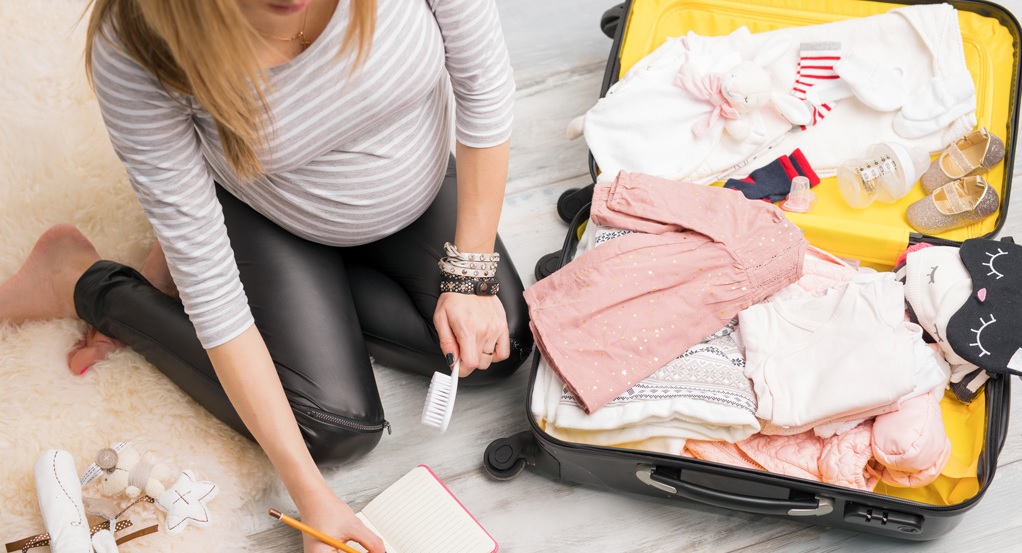
Now, this is one of the essential items in your hospital bag. According to Randazzo-Ahern, on average, moms who deliver vaginally stay in the hospital for one or two days and three to four days for those who give birth via cesarean section.
Therefore, while packing your clothes, you should keep in mind the number of days you would be spending based on your delivery preferences.
Considering the current situation of the world, Morgan Michalowski CNM, WHNP-BC, and IBCLC said “with COVID, you would want to limit bringing items into the hospital that you can’t wash.
It would be best if you considered taking along a plastic bag to put the clothes from the hospital in so that you can wash them immediately”.
Let’s see the different clothes you should pack. I would classify it for better understanding:
- Robes: usually, the hospital would provide gowns for you, but it is advisable to carry along a warm robe or sweater to keep you warm. Include bathrobe too.
- Loose/lightweight clothing and sleepwear: A cotton night wears alongside an eye mask would be very comfortable at night.
- Socks, slippers, and flip flops to stroll and keep your feet warm
- Seamless camis.
- Maternity Lounge Pants: This would help reduce the pressure of your clothes on your abdomen.
- Underwear: if you do not want to wear the mesh underwear hospitals usually give, then you should make sure to take several pairs of undies such as after band, breast pads (preferably disposable ones).
If you want to breastfeed, you’ll also want nursing bras that would enable you to breastfeed appropriately, while allowing you to also adjust and stretch because of the filling of your breast due to the incoming milk.
In case you don’t want to breastfeed, you can opt for a supportive sports bra instead.
- Extra-absorbent pads/adult diapers: you need these as you may stain due to heavy bleeding after delivery. A perineal spray is also an invaluable addition alongside ice packs, witch hazel pads, sitz baths, squirt bottles, and others in your post postpartum kit.
You could also carry your favorite pillow. It would give you a feel of your home and would make you comfortable.
Extra-Long Cell Phone Charging Cord
Sounds funny but you indeed need it. Most hospitals aren’t made with phone charger convenience in mind. An extra-long phone charger would come in handy here as you need to keep yourself busy since you would be confined to bed rest most of the time.
You could also take your earplugs, a deck of cards, a laptop, headphones, portable Bluetooth speakers for entertainment.
Credit Card or A Small Amount of Cash
Believe it or not, there are expenses asides from the necessary hospital bills. To avoid being taken unawares, it is advisable to have at least a small amount of cash at hand or even better, a credit card.
Snacks and Drinks
You have just gone through one of the most glorious but draining experiences a human being can pass through; a good snack would go a long way in giving you the refreshment you need. It could be a chocolate bar or a cookie. Just take one or two of it.
A water bottle would also do the trick in the case of water and other drinks.
Mini Fan
Medical research has shown that the temperature of a pregnant woman rises due to hormonal changes, increased blood flow, and the heat produced by the placenta.
According to The American College of Obstetricians and Gynecologists (ACOG), pregnant women should not allow their core body temperature to rise above 102.2 degrees Fahrenheit (39 degrees Celsius).
The average temperature of a pregnant woman is 98.6 degrees Fahrenheit (37 degrees Celsius), and the usually elevated temperature is around 0.4 degrees.
Hence, carrying portable fans along with water mister or facial spray is one of the recommended ways of controlling your body temperature when pregnant. It would also help a lot during labour to keep you calm and less sweaty.
If you noticed, most of what we talked about is mainly what the mother needs. We surely can’t leave out the baby. Now, let’s look at the baby’s share in the hospital bag checklist. Here we go!
HOSPITAL BAG FOR A BABY
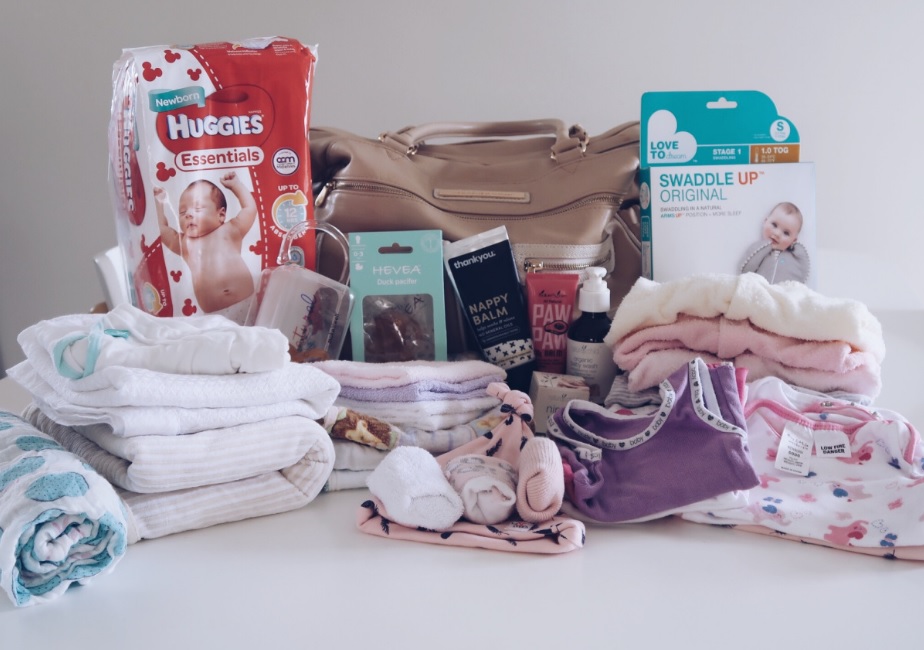
Packing for your baby is probably the most exciting part of all, but you should note that babies are delicate so you should be careful with what and how you pack for them.
Asides from this, you would find out that the hospitals already have the perfect materials for your baby so you should not stress much about this. Read on to see the necessary materials to be packed for your baby.
A Going Home Outfit
While in the hospital, your baby does not necessarily need clothes. This is because of the numerous tests and checkups that the doctors and nurses are likely to carry out.
Wearing and removing your baby’s clothes would be quite a hassle for you and tiring for your little angel as well.
The necessary cloth to bring for the baby is the going home outfit. This could be a onesie which would be very comfortable for your baby.
An added benefit is that you would not have to worry about the diaper falling throughout the day.
Swaddle Blankets for Baby
Swaddling refers to the act of wrapping your baby in a small and thin blanket, usually with winged sides, closures, or snaps, which secure the sides around your baby.
This blanket is referred to as a swaddle blanket. It helps newborns feel secure, safe, and calm, and most importantly, protects them from slipping off from your hands. A receiving blanket can also be used to swaddle.
These blankets replace the baby’s clothes while still in the hospital.
Car Seat
Although this is not something you pack in a bag, it is essential for your newborn. Research has shown that for children less than the age of 1 year, using car seats decreases mortality by 71%.
Also, proper car seat use reduces the risk of injury, hospitalization, or death by greater than 70% when compared with seat belts or no restraints.
Your baby’s car seat should be picked with the utmost care when choosing which one to buy. It should be approved, with its base installed correctly in your vehicle.
Baby Sock and Hat
These are needed to keep your baby warm in the hospital room, especially at night.
Here’s something else. Are you scheduled for a cesarean section and you need to know exactly what to pack for your surgery? Worry not, cos I’ve got you covered.
WHAT TO PACK IN HOSPITAL BAG FOR C-SECTION?
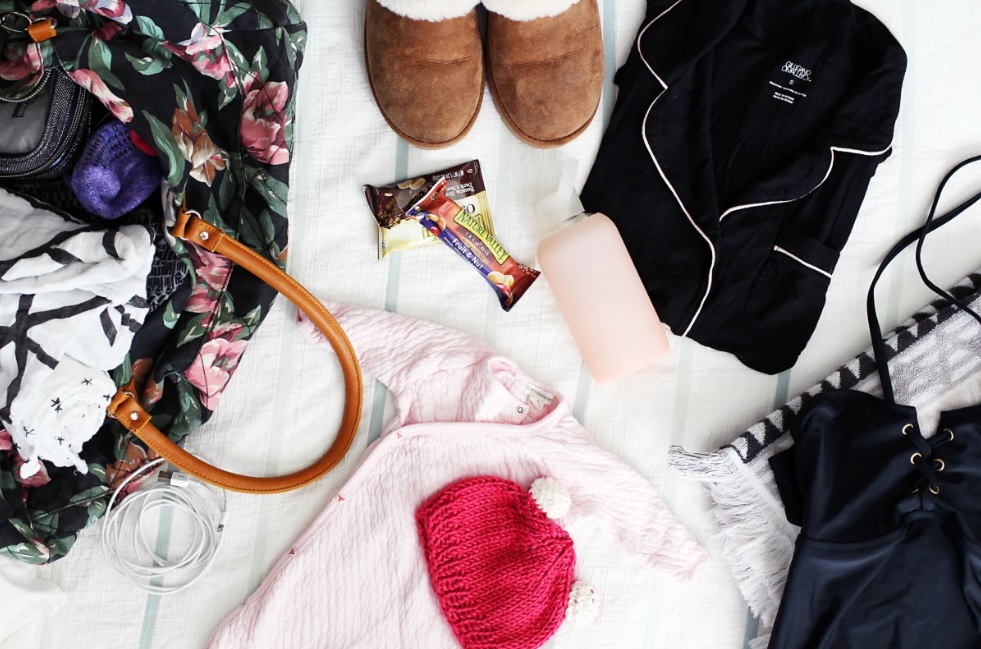
If you have scheduled a cesarean surgery, also known as C-section, then I’m sure you are equally as nervous as the mom going through vaginal delivery. Alongside your mental preparation, there are a few things you should do well to take along to the hospital.
It will vary slightly from the hospital bag for vaginal delivery, but the whole idea is the same- for comfort. According to Randazzo-Ahern, C-section moms would spend about 3-5 days rather than the typical 1-2 days since they are recovering from both childbirth and surgery.
Let’s take a look at the items you need during your stay;
- Cesarean birth plan, which includes:
- Preferred anaesthesia.
- Your doula/birth partner.
- Photo permission.
- Postpartum management and baby care options.
Note: you should be flexible when making your cesarean birth plan, in case of unexpected situations.
- A folder containing your medical and insurance records.
- Eyeglasses: make sure to take this along because even if you use contact lenses, you would be asked by the anesthesiologist to take it off before the surgery.
- Lip balm to moisturize your chapped lips.
- Phone and extra-long charging cord in case the charging outlet is far from your bed. Try to pack a book to while away time after your surgery.
- Toiletries such as toothbrush, toothpaste, soft towel, sponge, shampoo, hairdryer, nipple cream, and other personal items.
- Comfortable pillows, preferably with a patterned case so that the hospital won’t mistake it for laundry.
- Breastfeeding pillow to prop your baby up away from your incision.
- Backless slip-on shoes and easy to flip flops so that you would not have to bend over when wearing them.
- Clothes such as;
- Robes and socks for warmth
- Underwear with comfortable cotton pairs to avoid digging into your incision
- Nursing pads or adult diaper for bleeding
- Maternity bras for breastfeeding
- Comfortable and loose clothing such as joggers, maternity gowns, maternity lounge pants
- Since constipation is usually expected after C-section, it is advisable to take fiber-filled snacks to ease it. Mouth fresheners also help to alleviate any sick feeling you might have.
- Compression belt/girdle.
Since your abdominal wall would be a lot weaker after your surgery, most doctors advise wearing a postpartum girdle around your midsection.
This would aid easy movement, reduce swelling, give support to your lower back and core muscles while protecting the incisions. The hospitals usually provide this, but you can bring yours for more comfort.
- Small amount of cash/credit or debit card for other expenses asides from hospital bills
Since you now know what to pack in your hospital bag during pregnancy , it’s essential you know when to start packing.
WHEN TO START PACKING HOSPITAL BAG?
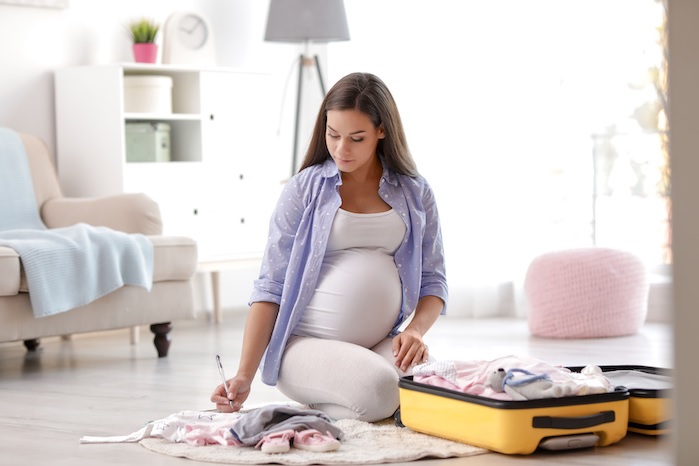
There are a lot of things that might need your attention while pregnant, one of which is your body’s delicacy. You might also be occupied with antenatal care, exercises, setting up your baby’s room, buying baby’s clothes and diapers.
If you pack too early, you might end up battling with the dust on your box, and if you do it too late, you would most likely end up being overwhelmed with the thought of what to and what not to carry. Then you might ask; when exactly is the right time to pack? Let’s see the advice of some experts:
“If there’s a slight tendency of you having complications, you could be admitted, and delivery would most likely take place then”, says Nina Spears, a childbirth educator and founder of Baby Chick. Considering this possibility, she recommends having packed your bags around week 35 and week 37, being the latest.
Nicole Randazzo-Ahern, a medical director of the newborn nursery at MassGeneral for Children, advises packing at around week 35, for women with multiple pregnancies and sometime between week 37 and 38 for other cases
Other sources say week 32-34 is the best time, so to be on the safe side, you should start making your pregnancy hospital bag checklist by week 34 and have them all packed by week 37 at the latest.
I’m sure you wouldn’t want to start packing and find out that you have no more room in your bag to accommodate the remaining 12 out of the 20 things you plan to take. That would be a disaster. Let’s look at that now.
Which Hospital Bags You Should Buy
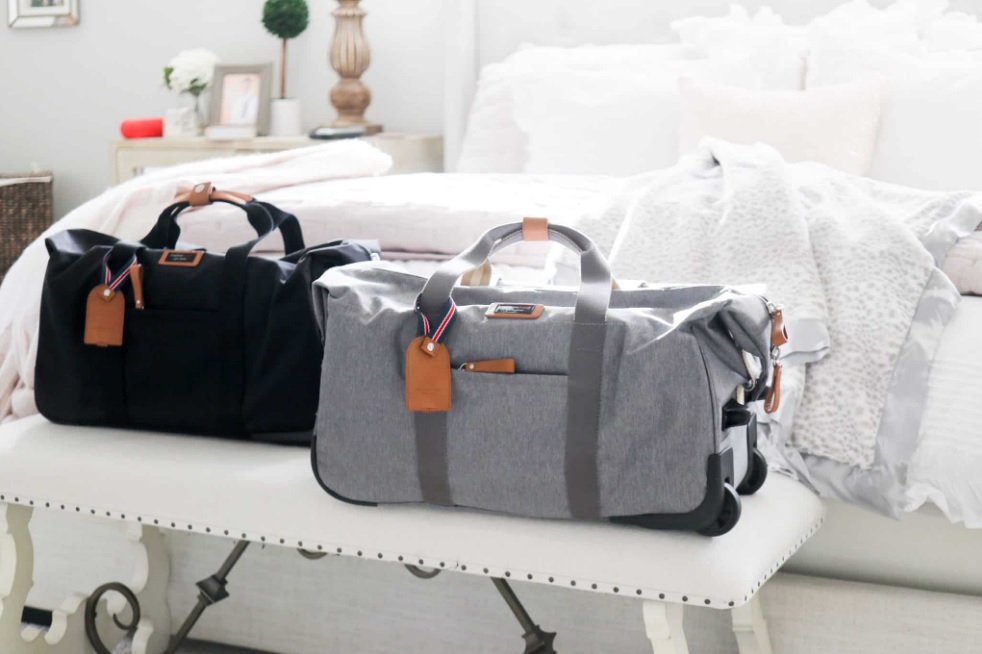
Choosing a good hospital bag is as essential as the checklist itself so you have to pick a quality bag that can contain all your hospital items.
Ideally, you might expect me to say something like this; a 75-meter long bag with a specific quality or brand and all that but guess what?
It’s your baby, your newborn, your bundle of joy. The best kind of hospital bag is the one which should, of course, be able to accommodate all the hospital essentials you want to put into it. The Bag might not necessarily be a fancy traveling bag.
Bags could be travel box, suitcase, duffle bag but it should be big enough, and well suited for your baby’s clothing as well as yours, for the period you would be staying in the hospital. It should also have enough space to accommodate the goodies that come with a newborn.
The hospital might probably give you presents, but they would surely give you diapers and underwear for you and your baby, so your bag should have enough space to accommodate this!
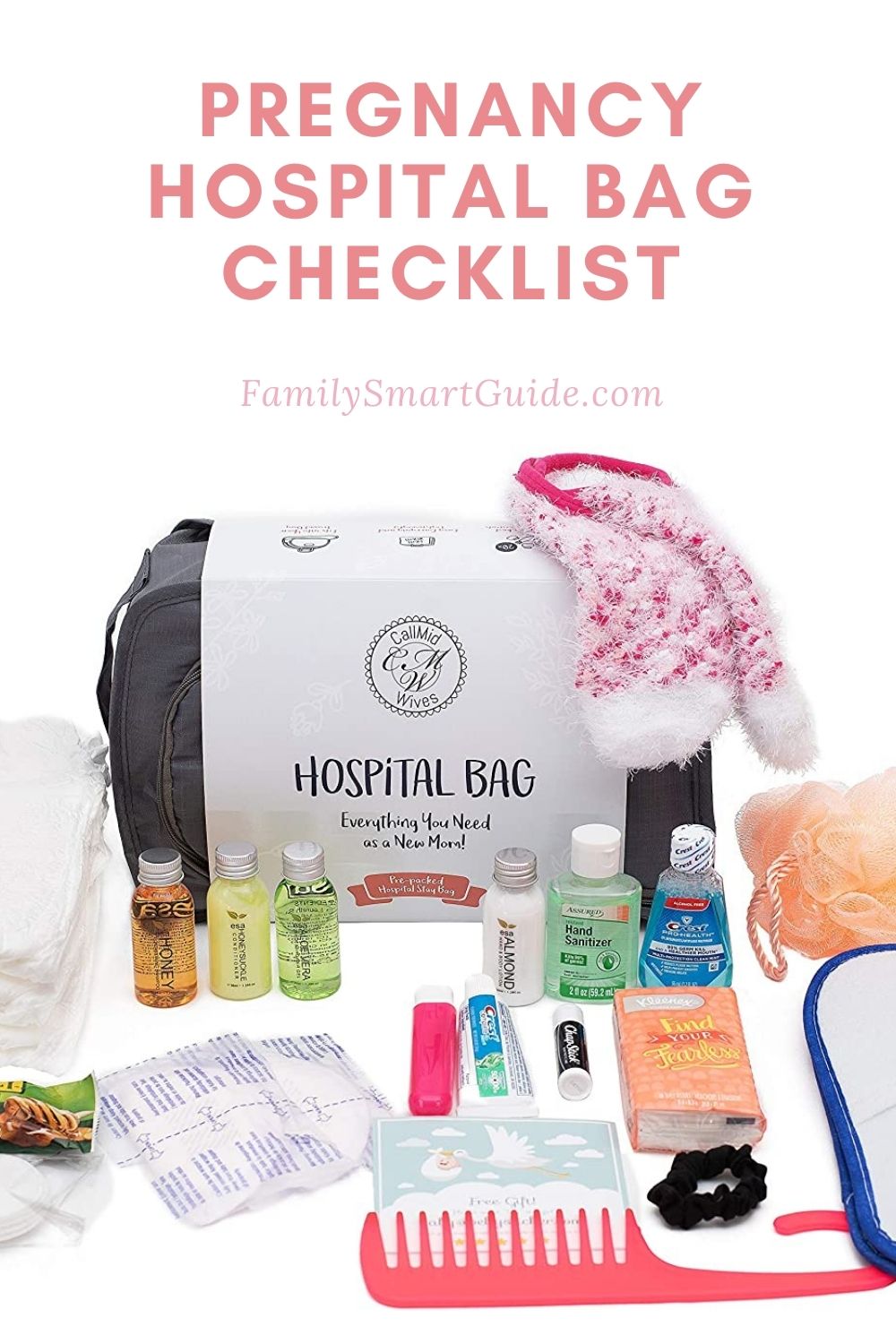
Final Words
Now, with the knowledge of what you should pack on pregnancy hospital bag, I’m sure you are ready to start packing. Please make sure you keep your hospital bag in places with easy accessibility like the boot of your car or near the front door of your house.
This way, you can quickly grab it even in the most distracting times (usually when the contractions start).
Some other things you should also take note of are:
- Make sure you cut your nails before you get to the hospital because the hospital staff would end up chipping it for you.
- Keep all your jewellery at home. You do not need it in the hospital.
If you take all these you’ve learned here and put it into action, then there’s no doubt that you are fully ready to welcome your angel into the world. You’ve got this!
